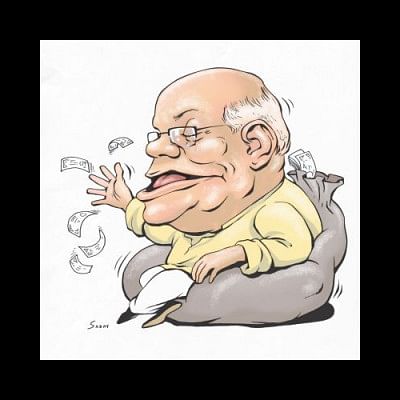Tax policies should be consistent

The boom in the manufacturing sector, especially in the developing countries has been a boon to the GDP growth of many traditionally consumer-oriented economies. The ease of doing business has played a key role in deciding where investors park their capital. Therefore, all the developing economies continuously compete with each other to make their jurisdictions user friendly so as to ensure the infusion of capital into their economy from these investments. In that context, a country's tax regime can walk that extra mile to boost investors' confidence and induce stability into the economy for growth in various sectors, especially manufacturing.
A country's tax regime is a key policy instrument that may negatively or positively influence investment climate. An overall tax policy design may include: efficiency concern which calls for as little interference as possible with market incentives for investment; equity concern which is based on fairness implying equal taxation on equal incomes (horizontal equity) and higher taxation on higher incomes (vertical equity); simplicity and stability concerns displaying transparency; and adequate revenue generation concern.
Simplicity and stability of policy is one of the lynchpins in deciding the taxation laws of a country. Consistency may be viewed in two folds: stability of tax laws and whether the tax framework is compatible with the broader objective of development and economic growth.
Addressing the first leg of analysis, consistency in tax policy is generally considered more important by investors than predictability or complexity of tax regimes. Stable and consistent tax laws are conducive to long-term business investment.
One of the major problems that hinders consistency of tax laws in most countries is that there is a change in tax policies as governments change.
Usually, these policy changes are driven by political considerations rather than sound economic objectives and public interest. Thus the importance of providing greater tax certainty to taxpayers to support trade, investment and economic growth has become a shared priority of governments and businesses.
It is seen that both domestic and foreign investors generally have a long-term horizon when contemplating investment decisions, emphasising on both past trends and current business taxes of a country. The outlay of project cost includes tax cost and thus the taxation regime of a country influences business decisions. Therefore, erratic and abrupt changes in the tax laws may impact subsequent profitability of investors and shake their confidence.
Keeping this in mind, the government may consider the following points while formulating amendments or new tax laws from Bangladesh's tax perspective: introduce sector-specific tax exemptions instead of entity-specific exemptions; ensure that once a tax exemption is introduced for a particular sector all sources of income for that sector are exempted rather than specific ones; and avoid confusion regarding the number of years of exemption from a particular source or zone (for example, economic zones) based on contradictory circulars.
The second leg of analysis is regarding how consistent the tax laws are with broader economic goals. A tax incentive meant to encourage private participation in hitherto-deprived sectors would be an example of this. The central trade-off faced by policymakers often is that the taxes should be sufficient enough to be used for building infrastructure, improving labour skills, and strengthening governance and at the same time low enough to avoid discouraging economic activities and attract investments.
A strategic tax system needs to ensure fair value for natural resources i.e. neither excessive incentives nor outrageous tax burden on investors. Growing economies have, therefore, regularly used a public private partnership model to incentivise and fuel economic growth.
Successive governments need to evaluate various factors governing its economy in order to form a consistent taxation policy. The level of a country's tax burden needs to be juxtaposed with the overall stability and state of infrastructure as well as the cost of compliance. Investors are generally willing to accept a higher host country tax burden if the country offers attractive business-enabling market conditions, a stable framework, and location-specific profit opportunities.
However, in the context of economic profit that is not location-specific, comparisons of tax burdens in competing locations are expected to be factored in. If a given business activity can be carried out in a competing location with a lower rate of tax than that in the host country, investors would prefer the country offering a lower tax rate. On the other hand, if the competing low-burden location does not offer an attractive business infrastructure and stable macroeconomic environment, investors may be willing to pay a higher tax burden in the host country without being tempted to invest elsewhere. Transparency and certainty in interpretation of tax policies before judicial forums would also enhance the overall country score.
In this increasingly global business environment, it would augur well for Bangladesh's economy if the present government frames its tax policies to ensure certainty and stability in the long run. Investors across the world would have an eye open for the budget announcements due today to evaluate Bangladesh as a possible investment destination. These pointers could be some of the deciding factors for the prospective investors and prove instrumental in reaching the high growth targets set by the present government.
Sushmita Basu is partner of PwC for direct tax; Sk Aminul Islam, assistant manager; Diparun Mukherjee, associate director, and Bikash Chanda, manager.

 For all latest news, follow The Daily Star's Google News channel.
For all latest news, follow The Daily Star's Google News channel. 






Comments